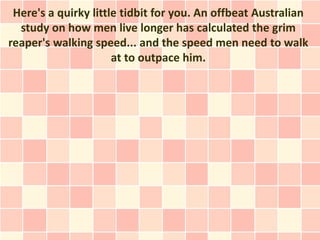
Men Live Longer If They Walk Faster
- 1. Here's a quirky little tidbit for you. An offbeat Australian study on how men live longer has calculated the grim reaper's walking speed... and the speed men need to walk at to outpace him.
- 2. It seems that those who can walk at a speed of 3 miles per hour live longer than those who move at a lesser pace according to the study.
- 3. Earlier work has found that the speed an older person walks helps predict their longevity- slow walking speed in old age has been associated to a higher death risk. Faster strides have been connected to a longer life.
- 4. Older adults who walk quickly appear to be healthier and more fit than those who move slowly. As a result of this, walking speed is a common measure of physical ability doctors use in older people.
- 5. The grim reaper, a familiar fictional symbol of death, is what that the Sydney based Concord Hospital team focused on, working to predict the likely walking pace of this strange, skeletal figure. By knowing how fast he walked, they would be able to tell you how much faster you'd need to go to get away from him.
- 6. To arrive at this figure, what the scientists did was examine data from over 1700 70 years old or older Australian men in good health who were participating in a study on men's health. About half were native Australian, another 20% were born in Italy and the remainder came from a variety of other nations. Each subject had to walk at their natural pace for around 20 feet, and was clocked two times over this distance, the best time being the one that was recorded.
- 7. Over the 5 year study period, 266 men died, and when the team analyzed the walking speed of these subjects, they estimated the walking speed of the grim reaper, that is, death. A pace of less than 1.8 miles per hour will have you meeting him, as this is the speed at which he prefers to walk.
- 8. Older men with walking speeds of more than 2 miles per hour were much less likely to die. Those who had the greatest lead on the grim reaper were those who walked the fastest. The 22 subjects who walked the fastest, at least three miles per hour, were still around 5 years later.
- 9. We know that walking is good for you, and there's an amazing amount of research to back this up. Walking brings big drops in the risk of diseases such as diabetes and heart disease, as well as reducing high blood pressure, increasing bone density and so much more.
- 10. What worries many in the medical field is that the percentage of adults who spend most of their day in a chair went from 36.8% in 2000 to 39.8% back in 2005 - one can only imagine how high the number is now. Fewer than half of us do enough exercise to get any benefit. Inactivity it seems, has become an expected part of our modern lives - remote controls, riding mowers, snow blowers, as well as the disappearance of safe places to walk have all played a part.
- 11. The thing is, inactivity is a preventable cause of death... and walking is an easy way to get up, get active and help men live longer.